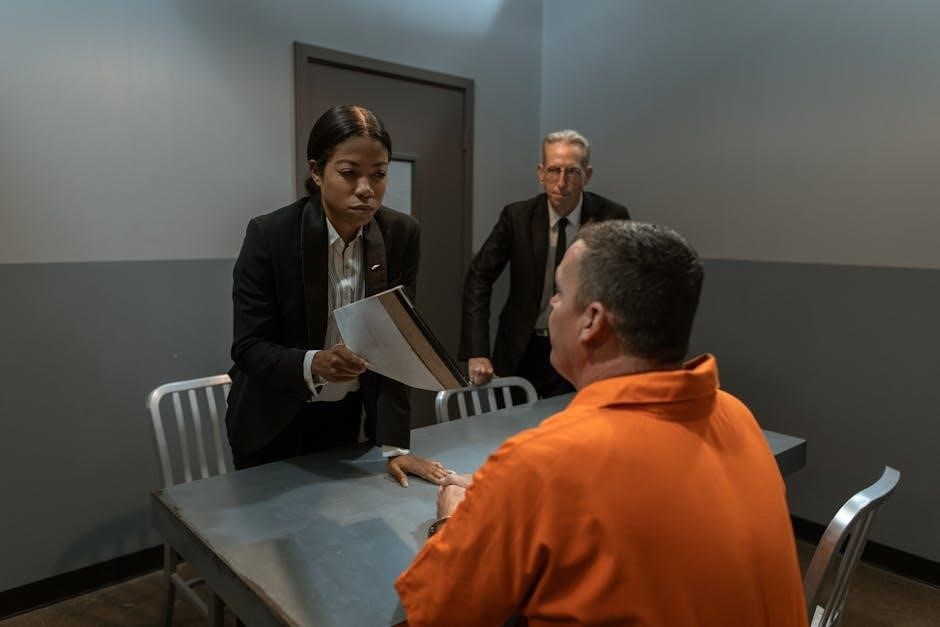Competency-based interviews assess specific skills and behaviors essential for policing roles. They evaluate decision-making, communication, and problem-solving abilities through structured questions, ensuring candidates demonstrate relevant experiences and traits effectively.
1.1 Purpose of Competency-Based Interviews in Police Recruitment
Competency-based interviews in police recruitment aim to evaluate candidates’ suitability by assessing specific skills and behaviors aligned with the policing profession. These structured interviews focus on competencies like communication, decision-making, and emotional intelligence. By asking scenario-based and behavioral questions, recruiters identify how candidates handle real-world situations, ensuring they align with the police competency framework. This method helps predict job performance and cultural fit within the force. It also ensures fairness and transparency in the selection process, as all candidates are evaluated against the same standards. The goal is to select individuals who demonstrate the necessary traits to excel in law enforcement roles effectively.

Key Competencies Assessed in Police Interviews
Police interviews evaluate essential competencies such as communication, decision-making, teamwork, emotional intelligence, and leadership. These skills ensure candidates can handle the demands of law enforcement roles effectively.
2.1 Communication Skills
Effective communication is critical for police officers, as it ensures clear interactions with the public, colleagues, and during high-stress situations. Candidates are assessed on their ability to articulate thoughts clearly, listen actively, and adapt their communication style to diverse audiences. Interviewers may ask for examples of times when clear communication resolved conflicts or ensured public safety. Strong responses demonstrate clarity, empathy, and the ability to convey complex information succinctly. Practicing scenarios and reviewing past experiences can help candidates showcase their communication skills effectively during the interview process.
2.2 Decision-Making and Problem-Solving
Decision-making and problem-solving are essential competencies for police officers, as they often face high-pressure situations requiring swift, logical, and ethical resolutions. Interviewers assess candidates’ ability to analyze situations, weigh options, and make sound judgments. Questions may include scenarios like resolving conflicts or handling emergencies. Candidates are expected to demonstrate clear thinking, prioritization of safety, and adherence to legal and ethical standards. Strong answers should illustrate a structured approach to problem-solving, such as identifying the issue, considering consequences, and selecting the most appropriate action. Practicing scenario-based questions and reflecting on past experiences can help candidates showcase their decision-making skills effectively.
2.3 Teamwork and Collaboration
Teamwork and collaboration are critical for police officers, as effective policing requires working with colleagues, partners, and the community. Interview questions focus on experiences where candidates contributed to group goals, supported others, and managed conflicts. Candidates should demonstrate an ability to communicate clearly, respect diverse perspectives, and build trust within teams. Strong answers highlight specific instances of successful teamwork, such as joint operations or community initiatives. Emphasizing active listening, adaptability, and a willingness to take on supporting roles can illustrate a commitment to collaborative environments. Practicing examples from personal or professional experiences helps candidates convey their teamwork skills convincingly during the interview process.
2.4 Emotional Intelligence and Empathy
Emotional intelligence and empathy are vital for police officers to effectively interact with diverse communities and handle sensitive situations. These traits enable officers to understand and manage emotions, both their own and others’, fostering trust and cooperation. Competency-based questions may ask candidates to describe situations where they demonstrated empathy, such as comforting a victim or mediating a dispute. Strong answers highlight active listening, understanding of different perspectives, and the ability to remain calm under pressure. Practicing responses using the STAR method can help candidates clearly articulate how they have used empathy to resolve conflicts or build rapport in challenging scenarios, showcasing their emotional intelligence.
2.5 Leadership and Initiative
Leadership and initiative are critical competencies for police officers, as they often face situations requiring decisive action and the ability to guide others. These traits demonstrate a candidate’s willingness to take charge, motivate teams, and solve problems proactively. During interviews, questions may focus on scenarios where the candidate led a group or initiated solutions to challenges. Strong answers should highlight clear decision-making, inspiring others, and achieving positive outcomes. Practicing responses using the STAR method can help candidates showcase their leadership skills effectively, emphasizing how they took initiative to resolve conflicts or improve team performance. This competency reflects the police service’s need for proactive and inspiring individuals who can lead with confidence and integrity.

Common Police Competency-Based Interview Questions
Questions focus on behavioral and scenario-based situations, assessing decision-making, communication, and teamwork. Candidates are often asked to provide examples of past experiences using the STAR method.
3.1 Examples of Behavioral Questions
Behavioral questions focus on assessing past experiences to predict future performance. Common examples include:
- Tell me about a time when you had to make a quick decision under pressure.
- Describe a situation where you resolved a conflict or difficult conversation.
- Give an example of a team project you led or contributed to.
- Share an instance where you demonstrated empathy or understanding in a challenging situation.
These questions are designed to evaluate competencies like decision-making, communication, and teamwork, often requiring candidates to use the STAR method to structure their responses effectively.
3.2 Scenario-Based Questions
Scenario-based questions present hypothetical situations to assess how candidates would respond in real-life policing scenarios. These questions evaluate problem-solving, ethical decision-making, and the ability to apply competencies in complex situations. Examples include:
- How would you handle a disturbance call where emotions are running high?
- Describe how you would respond to a situation where a community member is in distress.
- What would you do if you witnessed a colleague acting unprofessionally?
Candidates are expected to demonstrate clear thinking, prioritization of safety, and adherence to ethical standards. Answers should reflect practical policing skills and the ability to remain calm under pressure, aligning with the competencies outlined in the police framework.

Sample Answers to Police Competency-Based Questions
Sample answers demonstrate how to effectively structure responses using the STAR method, ensuring clarity and relevance. They highlight problem-solving, decision-making, and ethical reasoning skills required for policing roles.
4.1 Structuring Answers Using the STAR Method
The STAR method is a proven framework for structuring responses to competency-based questions. It stands for Situation, Task, Action, and Result. Begin by setting the context with a specific situation. Clearly define the task or challenge you faced. Describe the actions you took to address it, focusing on your role and decisions. Conclude with the outcome, emphasizing the results achieved. This approach ensures clarity, conciseness, and relevance, allowing candidates to demonstrate their skills and experiences effectively. By following the STAR method, applicants can provide well-organized answers that align with the competencies being assessed, enhancing their chances of success in police interviews.
4.2 Examples of Strong Responses
Strong responses in police competency-based interviews demonstrate clear, concise, and relevant examples of past experiences. For instance, when asked about decision-making, a candidate might describe a situation where they resolved a community dispute by actively listening to both parties and mediating a fair solution. Another example could involve teamwork, such as collaborating with colleagues to organize a neighborhood safety initiative. Effective responses use specific details to highlight skills like problem-solving, communication, and emotional intelligence. They also emphasize the positive outcomes achieved, showing how the candidate’s actions made a meaningful impact. These types of answers align with the competencies being assessed and leave a lasting impression on the interview panel.

Preparing for a Police Competency-Based Interview
Research the competency framework, practice common questions, and review the STAR method to structure responses effectively. Understanding the role and staying calm during the interview is crucial.
5.1 Researching the Police Competency Framework
Researching the police competency framework is essential to understand the key skills and values employers seek, such as communication, decision-making, and emotional intelligence. Reviewing official police websites, recruitment guides, and resources like the Ministry of Defence Police Competency Framework provides insights into expected behaviors. Additionally, downloading PDF guides, such as those offering answers to common questions, helps identify patterns and structures for responses. This preparation ensures candidates align their experiences with the required competencies, enabling them to tailor their answers effectively and demonstrate suitability for the role. Understanding the framework also boosts confidence and readiness for the interview process.
For example, the Police Interview Questions and Answers PDF offers valuable insights and examples to aid preparation.
5.2 Practicing Common Questions
Practicing common competency-based interview questions is crucial for success. Reviewing resources like the Police Interview Questions and Answers PDF provides insights into typical queries. Focus on behavioral and scenario-based questions, such as decision-making under pressure or teamwork examples. Use structured methods like the STAR technique ( Situation, Task, Action, Result) to frame responses. Regular practice helps refine answers, ensuring clarity and relevance. It also boosts confidence and reduces anxiety during the actual interview. Tailor responses to align with the police competency framework, emphasizing skills like communication and emotional intelligence. This preparation ensures candidates are well-equipped to address questions effectively and professionally.
